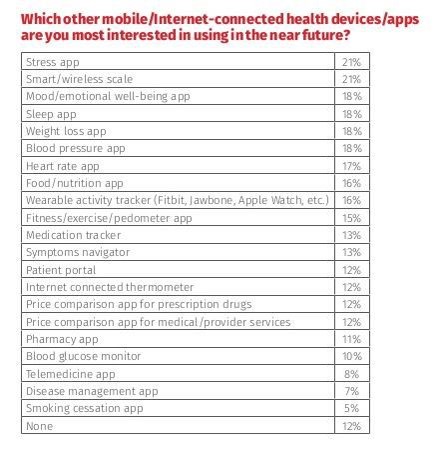 Managing stress, weight, mental health, sleep, and heart function are among the top-most desired reasons already-connected health consumers are interested in further connecting their health, according to The 2016 HealthMine Digital Health Report.
Managing stress, weight, mental health, sleep, and heart function are among the top-most desired reasons already-connected health consumers are interested in further connecting their health, according to The 2016 HealthMine Digital Health Report.
The most popular tools people use to digitally manage their health deal with fitness and exercise (among 50% of connected health consumers), food and nutrition (for 46%), and weight loss (for 39%).
3 in 4 people who use digital health tools say they have improved their health by connecting to these tools. 57% of digital health users also say going health-digital has lowered their healthcare costs. The survey pointed out that among digital consumers who have used telemedicine, 93% say it lowered their healthcare costs.
While 60% of those polled by HealthMine have electronic health records access, only 22% of these people have used EHRs to help them make health care decisions. And, while 75% of digital health consumers are willing to share their data with their own doctors and providers, only 32% say this happens “automatically,” according to HealthMine.
6 in 10 connected health consumers have a chronic condition, HealthMine learned. The top chronic conditions digital health users are managing are mental illness (such as depression or anxiety, chronic pain (back, shoulder, or neck), and obesity, based on HealthMine’s survey research. The most important motivation to use a digital health tool is to “know my numbers,” 42% of consumers said, with 26% of people noting that using digital health can help her manage her condition and/or reach health goals.
Of course, using an app generates personal health data that can flow to a third party. Digital health consumers’ willingness to share their personal health data with third parties varies by who that third party is:
- 75% of connected health consumers would share their data with their doctor or provider
- 39% would share with their health insurance plan
- 37% would share with family/friends
- 16% would share with scientific researchers
- 9% would share with their employer
- Only 7% would share with “no one.”
Some 63% of digital health consumers say they receive digital reminders for health actions in the form of emails or text messages from doctors, plan sponsors, or digital health tools; however, most of these consumers would not like to receive such communications.
HealthMine surveyed 500 consumers who use internet-connected health devices and/or applications in March 2016 for this survey. 58% of respondents were women, and 46% Millennials.
Health Populi’s Hot Points: This study, while built on a fairly small N of 500, focuses in on connected health care consumers who tend to be female and younger (mostly Millennial), based on HealthMine’s survey sample.
The two key benefits that connected health consumers identified from using digital health tools were (1) improving personal health and (2) lowering health care costs. Consumers could be even more effective in managing and improving health were their personally-generated health data connected automatically to health providers’ electronic health records for use, especially, in chronic condition management like heart disease and diabetes. A new paper from Health 2.0 and California HealthCare Foundation researching the use of APIs in healthcare found continued gaps in the top-selling EHRs’ collective ability to absorb data from consumer-facing digital health tools and apps.
Looking at the table, an exhibit from the study report, and see that connected health consumers are looking to better manage stress, weight, mental health, and sleep. These demands for new health tool adoption correspond well to the top three chronic conditions people are managing — mental health, pain and obesity. These issues directly relate to the social determinants of health: quality of relationships, healthy eating and drinking, good jobs with time to spare for social connections, financial stress, and quality sleep and mindfulness, among other factors.
Note that 33% of this consumer sample received or access their digital health tools through a wellness program. Employers well understand how the issues of mental health, pain and obesity connect right to their business’s bottom lines. Look for employers and plan sponsors to continue to support workers’ and consumers’ adoption of digital health tools for these issues, as I explained in my Health Populi post, Employers Changing Healthcare Delivery – Health Reform at Work.




 Thank you FeedSpot for
Thank you FeedSpot for